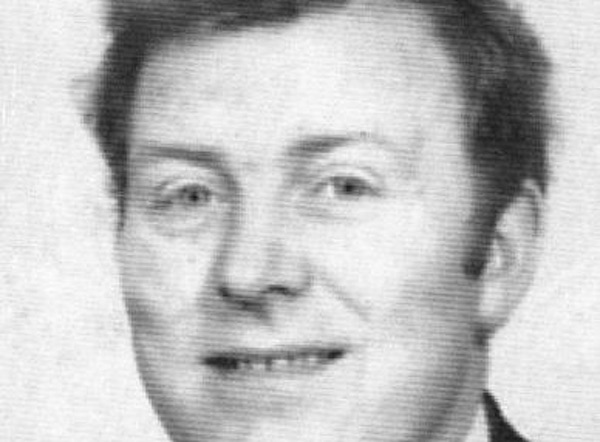
The family of Jim Loughrey, murdered by the Ulster Defence Association (UDA) in November 1976, have said they want to know how someone can be a suspect in four murders, but never be arrested or questioned by the police.
The suspect in questioned was named on the Police National Computer as being wanted for questioning for four murders, yet travelled freely around Britain, and reportedly ran a bed and breakfast in Scotland.
Last week, on the anniversary of their father’s murder, the Loughrey family lodged a complaint with the Police Ombudsman’s office, and they are now asking for witnesses to come forward with information about their father’s murder.
Jim lived in Greysteel with his wife Mary and their eight children aged between 4 and 15 years old.
Speaking to to the Derry Daily, the family said that on the night of Sunday, 14th November 1976, they were at home. Mary was busy in the kitchen, Jim was in the living room, and some of the children, Poilin and Anne-Marie, were upstairs. It was a typical Sunday evening in the Loughrey house.
There was a sharp knock at the door. Moments later there was another knock. This prompted Anne-Marie to come downstairs and Mary to leave the kitchen to go to the unanswered door. Jim beat them too it. As he opened the front door he was confronted by two gunmen and was shot several times. The two gunmen fled.
Jim’s injuries were extensive. He underwent surgery and survived eleven days, but passed away on 25th November. He was just 36 years old. No one was ever convicted for his murder.
The Ulster Freedom Fighters (UFF) claimed responsibility for Jim’s murder soon after. The UFF was cover name used by the UDA but they were one and the same organisation.
The Derry UDA were responsible for a series of murders in and around Derry during this period. The weapons used to murder Jim were also used in the murder of John Toland just a few days before, and one gun was used in the murder of Kevin Mulhern. The Derry UDA were also responsible for the murder of Michael McHugh in Castlederg and the attempted murder of a Catholic in Derry.
It is known that the Derry UDA operated in collusion with former and serving members of the Crown forces through the HET and historical prosecution through the courts.
In 1986 a loyalist prisoner called Leonard Campbell named those responsible for a host of UDA offences, including the linked UDA murders around 1976-77. This led to the arrest and prosecution of a number of individuals in connection with some of these murders including a serving UDR man and a former part-time RUC reservist.
Campbell named eight people as being involved in the ordering, planning and execution of Jim Loughrey. He said that the UDA Commander in Derry at the time had ordered Jim to be killed. This person was a former B Special and reportedly a former Royal Marine Commando. He was also named as being involved in Michael McHugh’s murder. The HET called him “Suspect 1”. Declassified British government documents and other open sources reveal that at this time “Mr Andy Robinson was the UDA Commander of the UDA district.”
When the Loughrey family received a report from the Historical Enquiries Team in 2013 it stated that “the possibility of some form of collusion between the security forces and loyalist paramilitaries in Jim’s murder cannot be ruled out.” They asked for answers.
In a joint press conference with the family of John Toland they asked the Chief Constable, the Director of Public Prosecutions and the Secretary of State to answer the following questions:
Who was Andy Robinson really working for and why was he never arrested over the years?
What were the circumstances surrounding his disappearance?
Could murders, including those of Jim Loughrey and John Toland, have been prevented?
These questions remain unanswered. Given the recent revelations of agent involvement in the Loughinisland massacre, last week, 41 years after the murder, Jim’s family lodged a complaint with the Police Ombudsman. They are also appealing for witnesses to their father’s murder to come forward via the Pat Finucane Centre.
BALLYMURPHY INQUEST
Meanwhile, a preliminary hearing for the inquest got underway this week into the 1971 Ballymurphy massacre, in which eleven innocent civilians were killed by British soldiers during the introduction of internment.
Campaigners gathered outside the coroner’s court to protest against the British government’s continued blocking of mechanisms to deal with the legacy of conflict and funding for inquests.
“This marks an important milestone in the Ballymurphy campaign as the preliminary hearing for the inquest finally gets underway,” Sinn Fein’s Gerry Kelly said.
“The Loughinisland families and other campaign groups were also there and the very fact these cases are now being heard is down to the determination and commitment of the families and their supporters.
“In some case, they have campaigned for over 45 years in the face of countless obstacles and resistance from a British state determined to cover up its role in the conflict here. To this day the British government is still opposing attempts to uncover the truth about their role in the conflict.”
![[Irish Republican News]](https://republican-news.org/graphics/title_gifs/rn.gif)
![[Irish Republican News]](https://republican-news.org/graphics/title_gifs/harp.gif)

